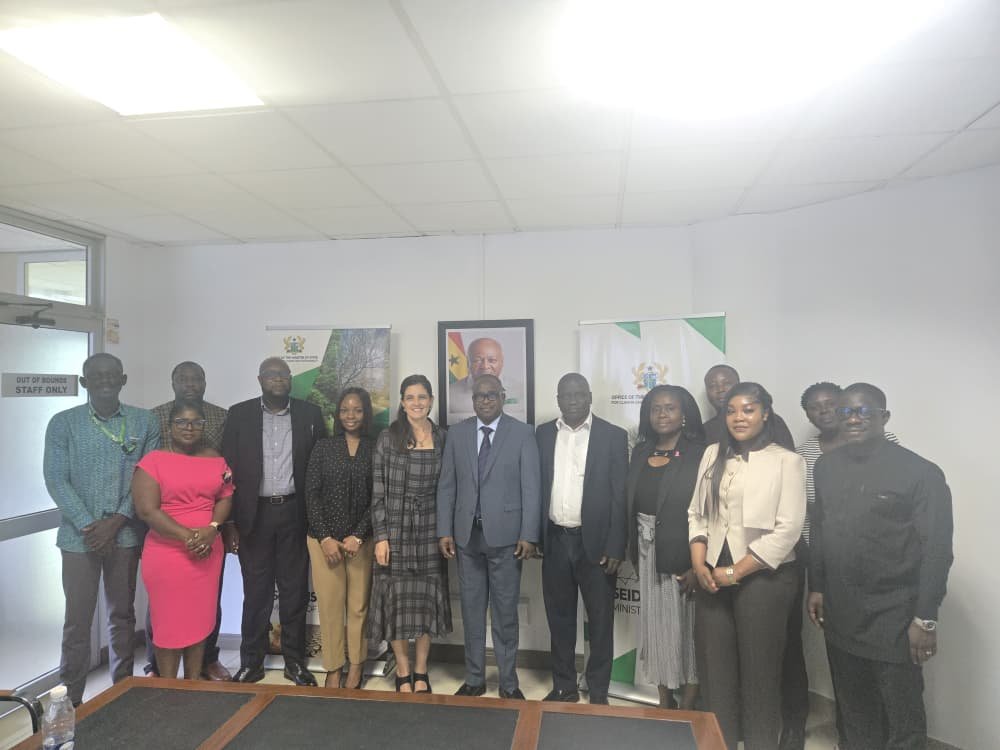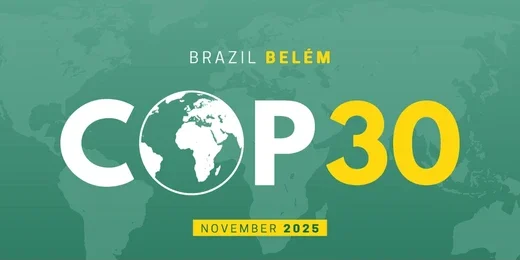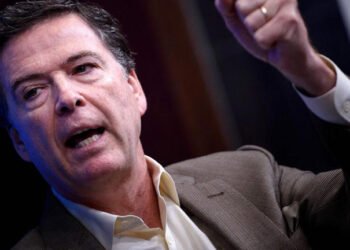With just a month to go before world leaders gather in Belém, Brazil, for COP30, Ghana and Brazil have reaffirmed their shared commitment to push for a just, inclusive, and results-driven global climate agenda.
On October 8, 2025, Brazil’s Ambassador to Ghana, H.E. Mariana Gonçalves Madeira, paid a courtesy call on Hon. Seidu Issifu, Ghana’s Minister of State for Climate Change and Sustainability.
The meeting, held in Accra, was attended by senior officials from the Ministries of Foreign Affairs, Finance, and Environment, as well as the CEO of the Environmental Protection Agency (EPA), Prof. Nana Klutse.
Ghana’s climate minister, Hon. Seidu Issifu, emphasized that climate justice must move beyond rhetoric to tangible results.
“Climate debt forgiveness is not charity; it is justice.
“Countries like Ghana spend more on external debt servicing than on protecting citizens from floods, droughts, and heatwaves. That is unacceptable.”
Hon. Seidu Issifu, Ghana’s Minister of State for Climate Change and Sustainability
He stressed that Ghana’s delegation to COP30 would advocate for a “finance package that goes beyond recycled pledges,” focusing on four key areas: debt relief and debt-for-climate swaps, reformed access to climate finance, high-integrity carbon markets, and scaled-up adaptation funding for the most vulnerable communities.
The visit comes at a crucial moment, as Ghana finalizes its national position for COP30, a conference many see as a potential turning point for climate justice and financing for developing nations.
Building a Just and Resilient Partnership

The discussions also centered on strengthening Ghana-Brazil cooperation across adaptation, mitigation, and sustainable development.
Both sides explored how their respective forest ecosystems, the Amazon and the Gulf of Guinea could form a “green corridor” of shared knowledge and mutual protection.
Ambassador Madeira, who leads Brazil’s second year of diplomatic engagement in Ghana, reaffirmed her country’s commitment to deepening ties with Africa.
“This COP will be a different COP.
“It must be measured by real outcomes by what changes for people on the ground.”
H.E. Mariana Gonçalves Madeira, Brazil’s Ambassador to Ghana
According to Ambassador Madeira, Brazil’s expansive network across Africa, spanning 34 embassies and three consulates, places it in a unique position to amplify African priorities on the global stage.
She expressed Brazil’s keen interest in Ghana’s Nationally Determined Contributions (NDCs) and its broader climate agenda, pledging support where it could make the most meaningful difference.
“The Amazon may be the compass at COP30, but Africa’s forests especially the Congo Basin and the Gulf of Guinea must be part of the same conversation.”
H.E. Mariana Gonçalves Madeira, Brazil’s Ambassador to Ghana
Hon. Issifu agreed, adding that Ghana’s new governance structure reflects a “whole-of-government” approach to sustainability.
He cited the establishment of the Office of the Minister of State for Climate Change and Sustainability, the creation of a Technical Working Group (TWG) to coordinate national climate policy, and the government’s broader “reset agenda” as proof of commitment.
In a move signaling fiscal prudence and focus, the minister confirmed that Ghana would streamline its COP30 delegation.
“We are reducing the size of our delegation and focusing on a lean, skilled team empowered to negotiate, partner, and deliver results. Less pageantry, more purpose.”
Hon. Seidu Issifu, Ghana’s Minister of State for Climate Change and Sustainability
The Technical Working Group, comprising officials from key ministries and agencies will ensure that Ghana’s COP30 outcomes translate into implementable projects at home, including green infrastructure, community resilience, and renewable energy investments.
Driving Real Change Through Collaboration

Both Ghana and Brazil agreed to host joint side events in Belém to advance South–South cooperation on key issues, including nature-based solutions, forest-positive cocoa production, climate-smart agriculture, and city-level adaptation.
These sessions are expected to bridge the gap between policy dialogue and investment-ready projects. Hon. Issifu highlighted the urgency of aligning ambition with action.
“Every dollar invested in resilience can return sevenfold in avoided losses and improved services.
“That’s the logic that must guide global climate finance going forward.”
Hon. Seidu Issifu, Ghana’s Minister of State for Climate Change and Sustainability
Ghana’s agenda for COP30 is rooted in pragmatism: mobilizing domestic and international capital, de-risking climate investments, and ensuring that funds reach the communities most affected by climate shocks.
The meeting concluded with both leaders reaffirming their commitment to a shared vision of justice, accountability, and results.
As the world turns its attention to Belém, Ghana and Brazil are aligning their strategies to make COP30 a turning point, not just for pledges and policy statements, but for real-world transformation.



















